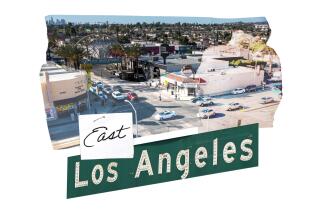L.A.’s mayor: We must shrink city government
No one needs reminding that we are in the middle of the worst downturn in generations, and that severe national economic conditions have hit especially hard here in Los Angeles. Every day throughout our city -- from breakfast tables to boardrooms -- Angelenos are being forced to make difficult choices to make ends meet.
Families are examining their values, deciding what they can really afford and cutting back on what they can’t. Businesses are setting their priorities and making spending decisions accordingly. At City Hall, we must do the same.
But at City Hall, our situation is different from that of many families and local businesses in one key way: The economic downturn is not the sole cause of our financial crunch. The recession has exposed structural budgetary problems that have existed for many years and that will not be ameliorated when the global economy recovers.
Quite simply, for many years the city of Los Angeles has been spending more money than it takes in. That is unsustainable in the long term, and we have reached the end of the line for quick fixes and one-time solutions.
If we are to get our city back on track to achieving the greatness and promise we all know it holds, we must fix our structural deficit.
Just like Angelenos all over our city who are making tough choices -- whether to buy food or prescription drugs, whether to choose school supplies or a doctor visit for their child, whether to pay their electricity bill or their rent -- the city must clearly state its top priorities and reduce or eliminate services it can no longer afford to provide.
None of the choices is easy, but we simply cannot continue to provide all of the services we currently do, and we cannot go forward with our city workforce at its current size. We have to protect those services that are vital and get out of those that are not essential -- either through public/private partnerships or by eliminating them.
That means accepting the hard truth: We have to reinvent a smaller city government with a smaller footprint focused on the most important needs.
In addition to the city’s fundamental mission -- operating a fire department, police department, sanitation department, port, airport, libraries and departments of transportation and water and power -- Los Angeles also maintains a number of ancillary functions that are money losers. These include a large convention center, a number of multistory parking structures, thousands of parking meters, numerous golf courses and a zoo. The convention center, the zoo and city-owned golf courses lose a combined $75 million annually.
The time has passed when we can afford to lose money offering services that other cities have long since shown can be better provided in concert with the private sector.
It would be wonderful to be able to continue to do it all, but we cannot. And if forced to choose between operating golf courses and funding the police officers who have given us the lowest crime rate since the 1950s, I choose public safety. If it is a choice between the Fire Department and operating parking structures, I choose the LAFD.
There is no way around the fact that fixing our structural deficit also means we have to lay off some of our city workforce. I have always believed in government as a positive force in any civil society. I do not think government should be smaller for the sake of being smaller. And I know how profound a statement it is for me, a former labor organizer, to say that in order to solve our structural deficit problem, we must significantly shrink our labor force. I do not want to -- nor can I -- sugarcoat this and say this will be easy or avoidable. The 1,000 layoffs I have already ordered are the minimum we will need. More will be needed -- the City Council is proposing an additional 3,000 job cuts.
But as important as each of those employees is to me, and as difficult as it is for me to lay these hardworking people off, the choices that we must make are for the greater good of our great city and all of its 4 million citizens.
Working together, we can return to a position of fiscal and financial strength for generations to come. The time for that action is now.
Antonio R. Villaraigosa is mayor of Los Angeles.
More to Read
Sign up for Essential California
The most important California stories and recommendations in your inbox every morning.
You may occasionally receive promotional content from the Los Angeles Times.










